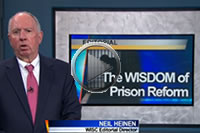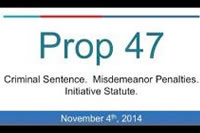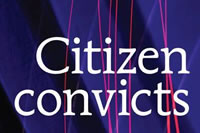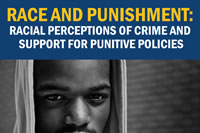 In this local news station’s editorial by WISC’s Editorial Director Neil Heinen, the wisdom of prison reform is discussed. In summary,
In this local news station’s editorial by WISC’s Editorial Director Neil Heinen, the wisdom of prison reform is discussed. In summary,
“There are a lot of problems with the criminal justice system in this country, and while public awareness and reform efforts are both on the rise, the problems persist. Some of the problems, sadly enough, will require systemic change that many of those in charge have stubbornly resisted.”
See the full video at channel3000.com![]()

 Prison reform is becoming a key issue in the race for Illinois Governor, with Republican challenger Bruce Rauner taking incumbent Gov. Pat Quinn task for keeping too many non-violent offenders behind bars in a state well over its current prison capacity
Prison reform is becoming a key issue in the race for Illinois Governor, with Republican challenger Bruce Rauner taking incumbent Gov. Pat Quinn task for keeping too many non-violent offenders behind bars in a state well over its current prison capacity  Voters in California are about to decide on Proposition 47, the Reduced Penalties for Some Crimes Initiative, which would reduce the classification of most “nonserious and nonviolent property and drug crimes” from a felony to a misdemeanor. Within the state’s large prison population, in addition to new sentencing guidelines going forward, 10,000 inmates would be eligible to have their charges reclassified to misdemeanors.
Voters in California are about to decide on Proposition 47, the Reduced Penalties for Some Crimes Initiative, which would reduce the classification of most “nonserious and nonviolent property and drug crimes” from a felony to a misdemeanor. Within the state’s large prison population, in addition to new sentencing guidelines going forward, 10,000 inmates would be eligible to have their charges reclassified to misdemeanors. When author John Grisham spoke out against the sentencing unfairness in cases of child pornography in comparison to child molestation, the backlash was both swift and severe. Here’s why one National Public Radio Contributor felt the response was undeserved:
When author John Grisham spoke out against the sentencing unfairness in cases of child pornography in comparison to child molestation, the backlash was both swift and severe. Here’s why one National Public Radio Contributor felt the response was undeserved: Prisons Foundation is a group dedicated to publishing books and guides by and for inmates and they currently have immediate opportunities for the public to help prisoners, both in D.C. where they are headquartered, and nationwide.
Prisons Foundation is a group dedicated to publishing books and guides by and for inmates and they currently have immediate opportunities for the public to help prisoners, both in D.C. where they are headquartered, and nationwide. In this new book by Cormac Behan, take a look at one issue looming over released convicts around the world: many felons lose the right to vote after their conviction. Many democracies remain divided on their beliefs on the voting rights of this ever-growing population, and in several places, including the Republic of Ireland – the main focus of this book – the issue is coming to a head.
In this new book by Cormac Behan, take a look at one issue looming over released convicts around the world: many felons lose the right to vote after their conviction. Many democracies remain divided on their beliefs on the voting rights of this ever-growing population, and in several places, including the Republic of Ireland – the main focus of this book – the issue is coming to a head. According to a report recently released by the Bureau of Justice Statistics, although federal inmate numbers decreased slightly in 2013, overall prison populations still increased by .3% as many new prisoners find themselves locked up due to state laws.
According to a report recently released by the Bureau of Justice Statistics, although federal inmate numbers decreased slightly in 2013, overall prison populations still increased by .3% as many new prisoners find themselves locked up due to state laws. The prison count has fallen every year since 2010 and the racial gaps in imprisonment rates have decreased. However, the race issue has ongoing importance as demonstrated by the killing of an unarmed African American teenager in Ferguson, Missouri and the public response it provoked.
The prison count has fallen every year since 2010 and the racial gaps in imprisonment rates have decreased. However, the race issue has ongoing importance as demonstrated by the killing of an unarmed African American teenager in Ferguson, Missouri and the public response it provoked. In this video, Louise Bours of the United Kingdom’s Independence Party (UKIP) and a member of the English Parliament, debated capital punishment with Frances Crook of the Howard League for Penal Reform.
In this video, Louise Bours of the United Kingdom’s Independence Party (UKIP) and a member of the English Parliament, debated capital punishment with Frances Crook of the Howard League for Penal Reform.